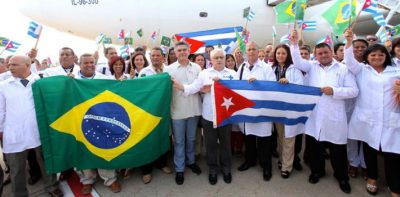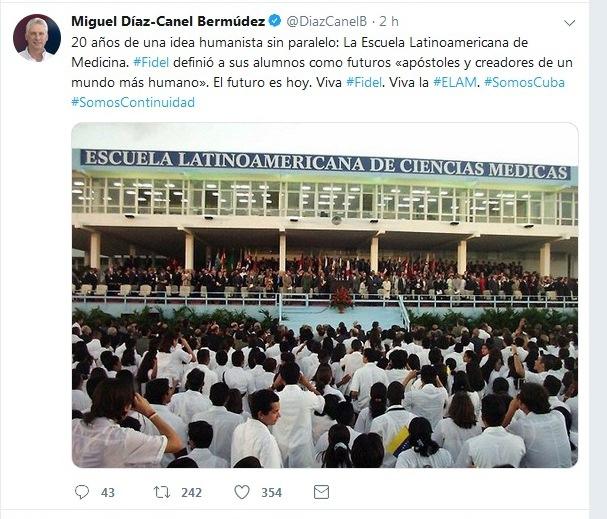Brazil’s Bolsonaro, “More Doctors” from Cuba , and a Déjà Vu
The Brazilian people suffer the consequences of Bolsonaros’ attacks on Cuba and a Cuban professor discusses the broader context

It was 2013, in Brazil President Dilma Rousseff was launching the program Mais Médicos (More Doctors) to establish Brazilian doctors and those from other nations in poor areas and remote settlements around the country, an initiative that thousands of Cuban professionals would join.
In Venezuela, at that time, right wing Presidential candidate Henrique Capriles regularly threatened Cuba, saying he would not “finance” our political model or “give” us oil, making the “disinterested” offer to Cuban doctors working there to “become citizens of a country where there is democracy.”
If this script appears familiar, that it has been repeated many times, you are right. What President-elect Jair Bolsonaro has just done – dynamiting the More Doctors program guaranteeing access to quality health care to millions of Brazilians – is no different from all other attacks by the regional right on Cuban international collaboration.
Bolsonaro calls the Cuban government “dictatorial,” while he openly defends the military dictatorship that between 1964 and 1985 ruled Brazil, where memories are still fresh of forced disappearances and assassinations, along with repression of any political opposition whatsoever. Seems like a bad omen for Brazil: A new President who does not understand exactly what a dictatorial regime is.
The déjà vu is confirmed when he says,
“I will offer political asylum to thousands of Cuba doctors who do not want to return to their country.”
It is not surprising that encouraging the desertion of Cuban doctors provides the backdrop to this position, in a context in which a highly qualified workforce is one of the country’s major strengths, and Cuban doctors, along with those from other nations trained here, promote a positive image of the nation and provide an example of South-South cooperation.
President Díaz-Canel congratulates the Latin American School of Medicine in its anniversary. Thousands of doctors from around the world have been trained here – including Brazilians, who face obstacles, created by the Medical Association in their country, like revalidation exams which control access to jobs. Photo: Twitter
This type of sabotage has a strong resemblance to the Parole Program for Cuban Medical Professionals, a migratory scheme cooked up by the U.S. government that was in effect until January 17 of last year. At that time, after a year of negotiations encouraged by the beginning of normalization of relations between Havana and Washington, an agreement was signed to guarantee regular, safe, and orderly migration, eliminating the Parole Program and the “wet foot-dry foot” policy. This was one of the last steps taken by President Barack Obama.
For more than a decade, the Parole Program created in 2006 by George W. Bush, encouraged Cuban health personnel working in third countries to abandon their missions and emigrate to the U.S. – a reprehensible practice that affected not only Cuba but the health programs of countries where they were working.
An Old, Well Known Formula
“The intention was clear: to damage Cuban cooperation with other countries; to reduce income in the form of payments for these programs; and to deprive the country of its the doctors and other medical professionals,” states Ernesto Domínguez López, professor at the University of Havana’s Center for Hemispheric Studies and the United States, in his article “Migration, brain drain, and international relations: The case of the United States and Cuba.”
For the researcher, the years during which these policies were implemented made them two of the most important components of U.S. migration policy toward Cuba, but he goes further.
“When we place this case within the much broader framework of the United States’ general immigration policy, we see that attracting educated foreigners to fill gaps in the U.S. workforce has been a traditional policy, reflected in the existence of the H1B visa. Under this regulation, scientists, engineers, and doctors have gone to work for institutions and companies in the U.S. – helping to maintain their privileged position throughout the world. This reality has become key to the U.S. economy and its universities,” states the researcher in the aforementioned article.
Domínguez reports that there are studies showing that the world’s richest countries have effectively implemented policies to absorb qualified immigrants, although research on the subject is still insufficient. “The area that has received the most permanent attention is the brain drain of medical professionals from poor countries. This is a particularly sensitive issue, due to its ethical and practical implications. In fact, the availability and quality of health care have a significant impact on essential health indicators, which are considered by prominent scholars as a fundamental source of inequality between countries.
“In its current state, the brain drain cannot be completely explained without a global analysis, which considers structural inequalities, migration networks, world politics, especially the asymmetries in the distribution of power, and even the hegemony of Western and cultural media. Industries that create images, perceptions and aspirations, thus distorting social interactions of different types,” writes Domínguez.
According to the researcher, arguments supporting this assertion are based on a fundamental idea: the brain drain, as part of a global migration pattern, is possible due to the levels of inequality between and within countries, as shown in multiple studies. These inequalities are not accidental, but structural components of the modern world order, understood as a result of the global hierarchy in distribution of power, wealth, and development,” he emphasizes in the article.Following this logic, any attempt to undermine and weaken one of the country’s most valuable resources – its professionals – is not fortuitous, or an isolated chance event.
Bolsonaro’s attack was also a clear signal of agreement with U.S. foreign policy, , not according to Cuba, but as noted by U.S. Assistant Secretary of State for Western Hemisphere Affairs Kimberly Breier, who applauded the position taken by the future Brazilian head of state, which made necessary Cuba’s decision to withdraw its collaborators from the More Doctors program.
In Context
1. The law establishing the More Medical program is clear as to how the licenses of physicians are accredited and the role played by the Pan American Health Organization, the Ministry of Public Health, and Cuban universities of medical sciences in the process. Cuban collaborators took exams before traveling to Brazil and periodic tests during their stay, conducted by Brazil’s Ministry of Health.
2. The offer to revalidate the professional credentials of doctors who stay as individuals are deceptive because the country’s Medical Association opposes this. There are thousands of doctors in Brazil whose licenses have not been revalidated. For every 100 doctors who take the required exam, only eight pass. This is a conscious strategy to keep the private health market controlled, to guarantee enormous incomes – fewer doctors equals more money – hence the opposition from the beginning to the More Doctors program.
3. Cuban doctors provide services in places where Brazilian doctors, and those from other countries, do not want to work. They assume the dangers because of their vocation to save lives. They are in the places of greatest risk, in communities of extreme poverty, in favelas, and violent neighborhoods where even the police do not enter. They are in the 34 indigenous special districts and 700 municipalities that never before had seen a doctor. To date, the people and the government have protected them, but this protection will be withdrawn by the new government.
*
Note to readers: please click the share buttons above. Forward this article to your email lists. Crosspost on your blog site, internet forums. etc.
Featured image is from PanAm Post


